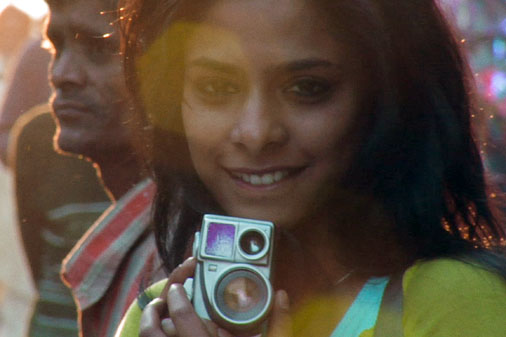 PATANG: THE KITE
PATANG: THE KITE
Khushi Films, Unrated, 2 stars
Among the biggest disappointments when visiting foreign lands and taking pictures of immense and astonishing places, is to return home and find what has been relegated to memory as amazing, is a tiny, dwarfed replica in a photo that can never duplicate what once captivated the senses and was captured by the human eye. Such is the earnest but never quite fulfilling experience of Patang: The Kite, an alternately tense and serene family drama playing out against the backdrop of India’s Uttarayana festival of kites.
Written and directed by first time filmmaker Prashant Bhargava, Patang: The Kite unfolds in provincial Ahmedabad in Gujarat, amidst India’s largest annual kite festival when thousands of those airborne images will fill the sky. Wealthy New Delhi businessman Jayesh (Mukkund Shukla) and his teenage daughter, Priya (Sugandha Garg) arrive unexpectedly at his childhood home and humble roots in Ahmedabad, as the kite festival is about to begin. And much to the surprise of his mother Ba (Pannaben Soni), widowed sister-in-law Sudha (Seema Biswas) and resentful wayward adult nephew, Chakku (Nawazuddin Siddiqui).
It soon becomes apparent that despite the initial welcoming overtures, there are longstanding animosities simmering beneath the surface. It seems that Jayesh prospered financially by selling off the Ahmedabad family business, and is accused by his nephew of impoverishing his late father and driving him to alcoholism and his ultimate death. And in his unabated quest for accumulating wealth, Jayesh has returned to convince the widowed women to sign papers to sell the family home and move to a cheaper living situation, pressure which his mother refuses.
A number of other underdeveloped stories swirl around this rather muted dramatic center along with the mounting array of kites filling the sky. Including Priya encouraging then spurning an infatuated local young man she seems to decide is beneath her social class, Chakku instructing street urchins how to steal apples from the outdoor market, and later one of them falling off a roof while leaping after a stray kite.
One provocative and rarely pursued them in movies that materializes in Patang, is class conflict brewing, not in society. But rather as a revealing microcosm of colliding class differences within a single family.
And the kite festival as extraordinary backdrop, ends by evolving more as a distraction than an enhancement of the story. Because the enormous street throngs— enchanted despite their grueling poverty by the kite filled sky, kites that to theatergoers may be mere distant dots on the screen in endless replay— appear to be having a lot more fun than we are.

































